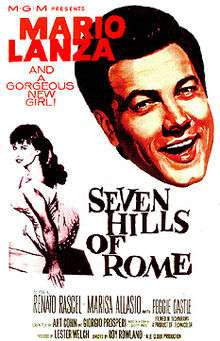Seven Hills of Rome (film)
| Seven Hills of Rome | |
|---|---|
 Theatrical poster for the USA release | |
| Directed by | Roy Rowland |
| Produced by | Lester Welch |
| Written by | Art Cohn and Giorgio Prosperi |
| Starring |
Mario Lanza Marisa Allasio Renato Rascel |
| Distributed by | Metro-Goldwyn-Mayer |
Release dates | 30 January 1958 |
Running time | 107 minutes |
| Country |
Italy United States |
| Language | English |
| Budget | $908,000[1] |
| Box office | $2,155,000[1] |
Seven Hills of Rome (Italian title: Arrivederci Roma) is an Italian-American film released in January 1958 and shot on location in Rome and at the Titanus studios. The movie was filmed in Technicolor and Technirama, distributed by Metro-Goldwyn-Mayer, and was tenor Mario Lanza's penultimate film.
Plot
The film tells the story of Marc Revere, an American TV singer of Italian heritage who travels to Italy in search of his jet-setting fiancée, Carol Ralston, played by Peggie Castle. Revere moves in with his comical and good hearted cousin Pepe Bonelli (Renato Rascel), a struggling artist who also befriends a beautiful young girl, Raffaella Marini (Marisa Allasio), whom Revere had met on a train, and who develops a crush on him.
Lanza, after some difficulty, lands a contract to sing in a fine nightclub, but misses his opening night due to unforeseen circumstances during a date with Carol. A helicopter sequence showcases landmarks of Rome from the air. Like Lanza, this was Allasio's next-to-last film (the 17th of her career), as she would marry Count Pierfrancesco Calvi di Bergolo, grandson of King Victor Emmanuel III, King of Italy, in November 1958 and retire from the cinema.
Cast
- Mario Lanza as Marc Revere
- Marisa Allasio as Raffaella Marini
- Renato Rascel as Pepe Bonelli
- Peggie Castle as Carol Ralston
- Clelia Matania as Beatrice
- Carlo Rizzo as Club Ulpia Director
- Rossella Como as Anita
- Guido Celano as Luigi
- Carlo Giuffré as Franco Cellis
- Marco Tulli as Romoletto
- Paddy Crean as Mr. Fante
Music
The music was supervised and conducted by George Stoll, and included the following songs:
- "The Seven Hills of Rome" - Music by Victor Young, Lyrics Harold Adamson
- "Arrivederci Roma" - Renato Rascel
- "Calypso Italiano" - George Stoll
- "Vogliamoci tanto bene" - Music Renato Rascel, Lyrics Roger Berthier
- "Come Dance With Me" - Stan Browsher (EMI, Warner/Chappel Music)
- Imitation Medley (see below)
- "Cielito Lindo" - music by Quirino Mendoza y Cortes (1859-1957)
- "Loveliest Night of the Year" - just a stanza from Lanza's hit song
Among the selections that Lanza sings in this "vocal tour de force" (Variety) is "Arrivederci Roma", performed in the Piazza Navona (and recorded) with a young street urchin, Luisa Di Meo. In typical Lanza fashion, the star had encountered the youngster while in Rome and insisted on her appearing in the film. Lanza also performs a sequence of imitations of famous singers of the era — Perry Como; Frankie Laine; Dean Martin; and Louis Armstrong- "When The Saints Go Marching In" — committing to film what was one of his favorite party performances. Opera selections include "Questa o quella" from Rigoletto.
Production
The film was directed by Roy Rowland and was the first of only four films produced by Lester Welch. The screenplay was the last written by Art Cohn, who died two months after the film's release in the same airplane crash that killed famed producer Mike Todd, whose biography Cohn was writing at the time. Cohn partnered with Giorgio Prosperi on the script for the Lanza film, which was based on a story by Giuseppe Amato. The Italian title, Arrivederci Roma, was meant to be the American title of a film Lanza was scheduled to make in 1960, until he died in Rome in October 1959.
Reception
The film performed well at the box office. According to MGM records it earned $680,000 in the US and Canada and $1,275,000 in other countries, resulting in a profit of $162,000 for MGM.[1]
Awards
Seven Hills of Rome was nominated for a Laurel Award (1959) from Motion Picture Exhibitor magazine.
Sources
- Cesari, Armando. Mario Lanza: An American Tragedy (Fort Worth: Baskerville, 2004)
- Notes accompanying the 1990 video release of the film
See also
References
External links
- Seven Hills of Rome at the Internet Movie Database
- Seven Hills of Rome at Rotten Tomatoes
- New York Times review